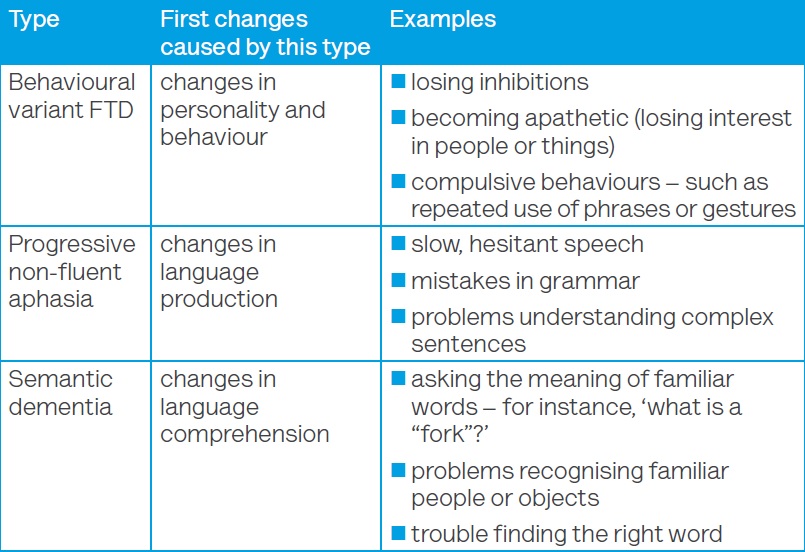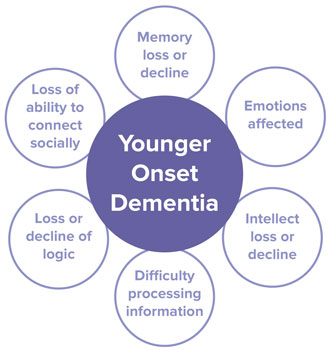5 Essential Facts You Should Know About Frontotemporal Dementia
5 Essential Facts You Should Know About Frontotemporal Dementia
Blog Article
Understanding the Effect of Dementia on Every Day Life and Caregiving
Mental deterioration influences every day life in profound methods, affecting not simply those identified however likewise their caregivers. As cognitive decline proceeds, you may notice adjustments in communication and regular that challenge both parties. Comprehending these shifts is important for keeping dignity and engagement. Exactly how do you adjust your caregiving techniques to support somebody traversing this complicated journey? The answers may amaze you as we explore the subtleties of this experience.
The Stages of Dementia and Their Results on Day-to-day Live
As you navigate the journey of dementia, comprehending its phases can considerably affect just how you manage life. Dementia normally advances through three main stages: early, middle, and late. In the beginning, you may observe periodic memory lapses or difficulty finding the best words. This can bring about stress, however acknowledging these indications early assists you adapt your routine and seek support.
During the center phase, you'll experience more noticeable cognitive decline. Daily jobs might come to be challenging, and preserving your freedom might call for changes. Using suggestions and simplifying your setting can help.
In the late stage, individuals commonly require considerable help with everyday activities. Preparation for care becomes important, focusing on convenience and lifestyle. By recognizing these phases, you're much better geared up to respond proactively, guaranteeing you or your liked one can navigate the challenges with self-respect and elegance.

Adjustments in Communication and Social Interaction
Just how do modifications in interaction impact your everyday interactions as dementia proceeds? As mental deterioration advances, you could see that straightforward discussions end up being difficult.
You may find it easier to attach with these ways as opposed to counting only on talked language. Paying attention skills can likewise change; you might find it tougher to keep in mind or follow discussions what was simply stated (Early Onset Dementia). This can cause misconceptions or feelings of isolation
Urging persistence and creating an encouraging atmosphere can help. Taking part in activities that foster connection, like songs or art, can boost social communications. Keep in mind, preserving relationships is still feasible; it's nearly adapting to new ways of interacting.
Effect on Daily Routines and Activities
While maneuvering everyday routines, you'll likely observe that jobs you as soon as finished easily become much more difficult as mental deterioration advances. You could locate on your own neglecting actions in acquainted regimens or battling to recall where you put products.
Planning your day can feel overwhelming, making it more challenging to adhere to a schedule. You may require suggestions for consultations or to take drugs. Adapting your environment can assist; as an example, identifying things or making use of lists can streamline jobs. Taking part in repeated, organized activities can also offer comfort and a sense of accomplishment. Remember, it's okay to ask for help. Bordering on your own with encouraging friends or family can make handling these adjustments a little bit easier.
Emotional and Behavior Obstacles
Steering via everyday routines can cause not just practical obstacles, however behavior and likewise emotional ones. You could discover adjustments in mood, such as enhanced anxiety or irritation, which can stem from complication or difficulty in completing jobs. As you navigate these moments, it is vital to acknowledge that your loved one may share their feelings via behaviors like frustration or withdrawal.
These emotional feedbacks can be uncertain and might occur without caution, leaving you both feeling bewildered. You might discover that acquainted environments or regimens can help minimize anxiety, however maintaining persistence becomes considerable. It is necessary to verify their sensations, even if you do not completely understand them.
The Function of Caregivers in Sustaining People With Dementia
As a caregiver, you play an important duty in providing emotional assistance for people with dementia. Establishing daily care routines can develop a sense of stability and comfort, aiding to ease their stress and anxiety. By recognizing their needs and utilizing effective techniques, you can greatly enhance their high quality of life.
Psychological Assistance Techniques
When looking after a person with mental deterioration, Our site recognizing the emotional landscape is vital for providing efficient assistance. You'll often find that patience and empathy go a lengthy way. Confirm their feelings; if they reveal confusion or disappointment, acknowledge it without rejecting their emotions. Simple gestures, like holding their hand or keeping eye call, can develop a complacency. Try to take part in activities that they appreciate, as this can trigger happiness and connection. Remember to communicate plainly and gradually, utilizing a calm tone. Urge expression via music or art, which can function as a powerful electrical outlet. Eventually, do not fail to remember to care for your very own psychological demands; looking for support for on your own can enhance your capability to look after them.
Daily Treatment Routines
Establishing day-to-day care regimens is vital for providing security and convenience to individuals with mental deterioration, as these routines can help in reducing complication and anxiety. You can begin by outlining a regular routine for dishes, activities, and remainder. This predictability helps your enjoyed one feel a lot more protected and involved.
Integrate acquainted jobs, like folding laundry or watering plants, which can stimulate positive memories and cultivate a feeling of achievement. Usage visual hints, such as checklists or calendars, to guide them through the day.
Be flexible, though; adapt regimens as needed based upon their mood or power degrees. Frontotemporal Dementia. Bear in mind, your perseverance and understanding are crucial in maneuvering browse around this web-site their transforming demands, guaranteeing they feel sustained and valued throughout their day-to-day life
Creating a Safe and Comfortable Living Environment
Producing a risk-free and comfy living setting is necessary for individuals with dementia. You'll wish to make home security alterations that lower dangers and assure familiarity to give a feeling of convenience. By concentrating on these elements, you can help produce an area that sustains both safety and security and wellness.
Home Safety Adjustments
As you browse the difficulties of dementia, making home security adjustments can substantially improve comfort and safety and security. Begin by eliminating tripping threats like rugs and clutter, assuring walkways are clear. Set up grab bars in restrooms and non-slip mats in the shower to protect against drops. Think about using brighter lights and night lights to enhance visibility, particularly throughout nighttime. Tag vital locations, such as the shower room and cooking area, with clear indicators to assist with orientation. Safeguard any kind of sharp things or hazardous compounds out of reach. In addition, analyze your home's alarm systems and locks to validate they're straightforward and offer satisfaction. These adjustments not just promote security yet likewise motivate independence, permitting your enjoyed one to really feel even more at ease in their setting.
Convenience and Familiarity
After ensuring a secure setting with necessary modifications, fostering convenience and knowledge is crucial for people with mental deterioration. Keep a constant regular to assist them feel grounded and lower anxiousness. Engaging in familiar tasks, such as listening to music or horticulture, can improve their sense of belonging, making their living setting a real refuge.
Approaches for Efficient Caregiving and Assistance
While maneuvering the obstacles of mental deterioration treatment can feel overwhelming, implementing reliable strategies can greatly improve both the caretaker's and the individual's everyday experience. Start by developing a routine; predictability helps in reducing anxiousness for both you and your liked one. Use clear, straightforward communication-- straight concerns and short sentences can protect against complication.

Don't forget to care for yourself; schedule breaks and get in touch with support system. Sharing experiences with others in comparable scenarios can supply useful understandings and emotional relief.
Lastly, remain patient and flexible. Mental deterioration can bring uncertain adjustments, so adjusting your technique is vital. By utilizing these methods, you can promote a more positive setting that profits both you and your liked one.
Frequently Asked Questions

What Are the Different Kinds Of Dementia?
You'll locate numerous kinds of mental deterioration, including Alzheimer's, vascular mental deterioration, Lewy body mental deterioration, and frontotemporal mental deterioration. Each kind influences memory and cognitive feature differently, so understanding the distinctions is vital for appropriate diagnosis and care.
How Can I Help Someone With Early-Stage Dementia?
You can help someone with early-stage dementia by being patient, offering assistance, and urging them to involve in tasks they take pleasure in. Keeping routines consistent and maintaining open interaction can additionally make a considerable difference in their day-to-day live.
Exist Financial Resources Available for Mental Deterioration Treatment?
Yes, there are funds available for dementia care. You can explore entitlement program programs, not-for-profit companies, and insurance coverage options. It's also a good idea to speak with regional agencies for specific resources customized to your situation.
What Lawful Considerations Should Caregivers Be Mindful Of?
As a caretaker, you need to take into consideration power of lawyer, healthcare proxies, and guardianship legislations. It's essential to recognize the lawful rights and obligations you hold, guaranteeing your loved one gets suitable treatment and security.
Just How Can I Manage Caretaker Anxiety?
You can handle caretaker stress by focusing on self-care, seeking assistance from pals or teams, setting realistic expectations, taking breaks, and exercising relaxation methods. Remember, your go right here wellness matters equally as much as the person you're taking care of.
Recognizing the Impact of Mental Deterioration on Daily Life and Caregiving.
As you browse the journey of dementia, recognizing its stages can substantially impact exactly how you take care of daily life.While navigating day-to-day regimens, you'll likely discover that jobs you as soon as finished effortlessly ended up being extra challenging as dementia advances.Developing day-to-day care routines is necessary for providing stability and comfort to people with mental deterioration, as these routines can assist minimize complication and anxiety.While maneuvering the difficulties of mental deterioration treatment can really feel frustrating, executing efficient approaches can greatly improve both the caregiver's and the client's everyday experience.
Report this page